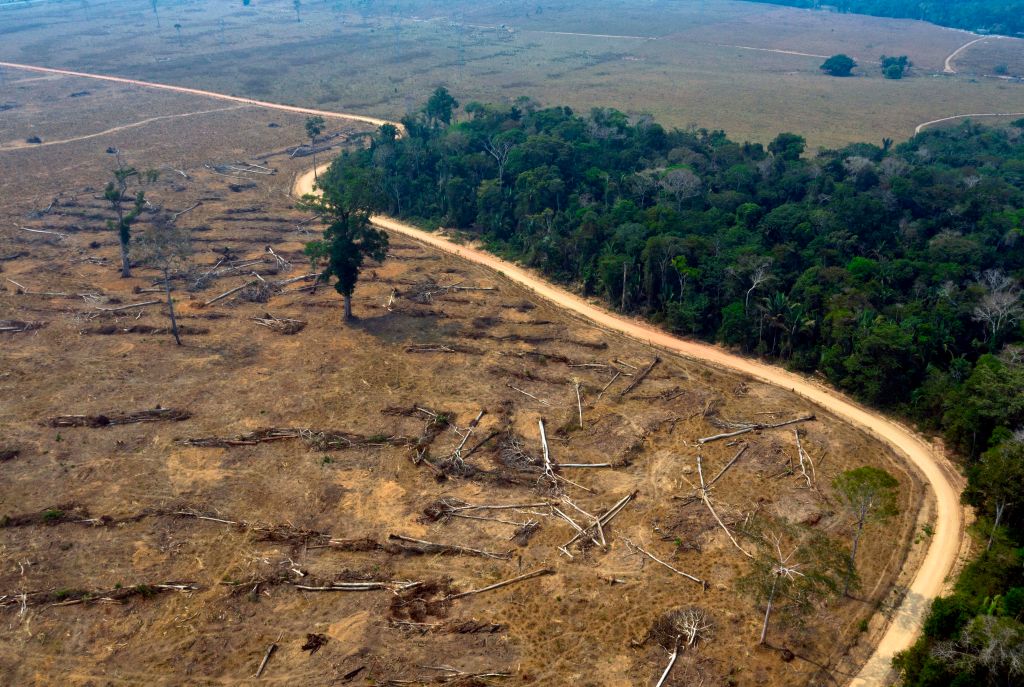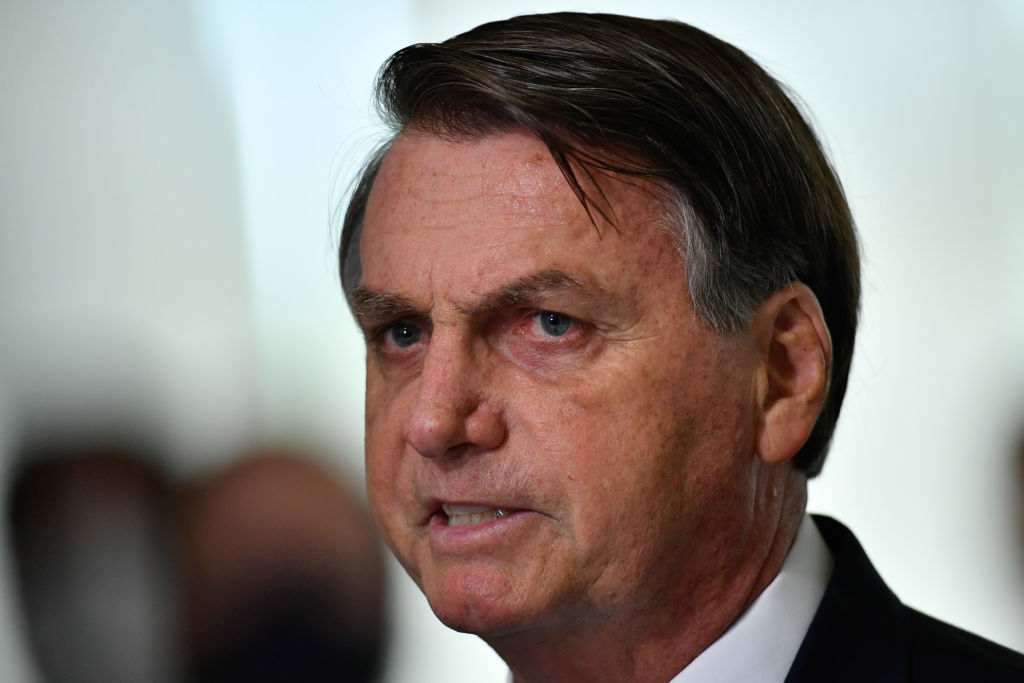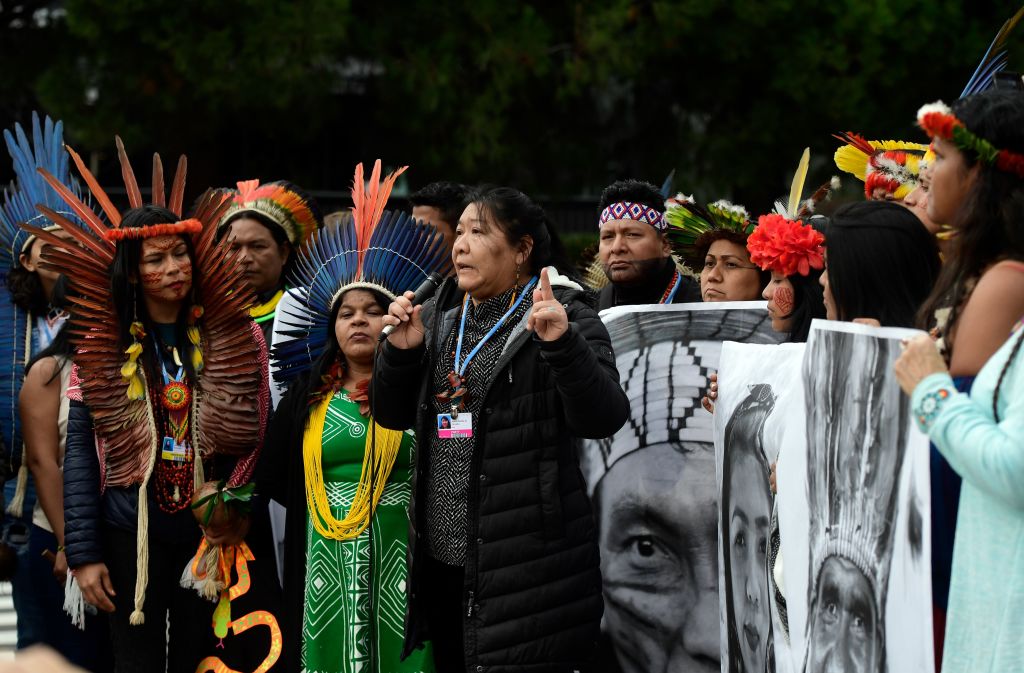
State governors, indigenous leaders and environmental groups in Brazil are sending a stark warning to President Joe Biden not to trust his Brazilian counterpart Jair Bolsonaro, as the U.S. attempts to strike a deal with the far-right leader to end deforestation in the Amazon.
Bolsonaro’s representatives have been in talks with Biden’s climate team since February, with billions of dollars in U.S. aid on the table if the two sides can reach an agreement on curbing deforestation in the world’s largest rainforest, along with other environmental goals. Just a week before a leaders’ summit on climate hosted by Biden, Bolsonaro sent the U.S. president a 7-page letter on April 14, promising to eliminate illegal deforestation––which accounts for an estimated 95% of deforestation in Brazil––by 2030.
But the governor of Brazil’s most populous state, São Paulo, tells TIME his president can’t be relied upon to keep that promise. “He won’t even try,” says João Doria, a political rival of the president. “Bolsonaro has demonstrated a total disregard for the environmental agenda and he hasn’t done anything to suggest he has any intention of changing his behavior.”
Doria is one of 23 state governors (out of 27 in total) planning to send a letter to Biden during the summit. Without mentioning Bolsonaro or the federal government, the letter, which has already been made public, lays out a potential partnership between the U.S. government and Brazilian states to protect the Amazon and other ecologically important Brazilian ecosystems. It points out that the states have “funds and mechanisms… available for the safe and transparent use of international funds, guaranteeing rapid and verifiable results.”
Since taking office in 2019, Bolsonaro has gutted environmental agencies’ budgets and attempted to loosen environmental regulations to make it easier for businesses to exploit the land, while dismissing and insulting foreign leaders who attempt to intervene. Environmental campaigners say his actions have created impunity for loggers, miners and smallholder farmers who illegally cut down and burn trees to use land in the Amazon and other protected landscapes, reigniting a problem that previous governments had brought under control. From August 2019 to July 2020, more than 4,200 square miles of rainforest were lost in Brazil, an increase of 47% over the amount deforested in the year to July 2018, before Bolsonaro took office.
“The U.S. should not strike an agreement with the federal government because it won’t be fulfilled,” Doria says. “They should make deals with state governments, one by one, with well established commitments and independent, transparent auditing of how funds are used.”

Bodies representing Brazil’s environmentalists and indigenous communities, as well as 15 U.S. senators, have also sent letters to Biden. They warn that a deal that does not include input and monitoring from representatives of civil society and state governments would give Bolsonaro leeway to use U.S. funds to tighten his grip on the rainforest and reward political allies.
“We need to have a permanent dialogue with civil society and states. I’m very afraid of what will happen if they close a deal only with Bolsonaro’s government,” says Joenia Wapichana, Brazil’s only indigenous member of congress. “Many in Brazil would say that unless Bolsonaro radically changes his policies on the Amazon, they shouldn’t make a deal. “
A State Department spokesperson tells TIME that the U.S. believes it is “realistic for Brazil to achieve a real decrease in deforestation” by the end of the 2021 fire season. “We would very much hope President Bolsonaro would use this opportunity to demonstrate his seriousness in addressing climate change, including emissions from deforestation in the Amazon,” they added.
Last chance to build bridges
Despite the risks, now may be Biden’s best chance of engaging Bolsonaro’s administration on the environment. The Brazilian president has suffered severe political setbacks in recent months, including his mishandling of the COVID-19 pandemic ––classed as the worst government response in the world by Doctors Without Borders––which is now the subject of a senate inquiry and the overturning of corruption charges against key electoral rival for 2022, former leftist president Luis Inácio Lula da Silva.
“We are in a moment where Bolsonaro is weak and under enormous pressure, so if you can’t get a deal from Bolsonaro now, I don’t see that you will get a deal with him later in this term or after he’s reelected,” says Thomas Traumann, a Rio de Janeiro-based political analyst and columnist for Brazilian magazine Veja.
Striking a deal on the Amazon would put Brazil “back at the table” in multilateral relations after increasing isolation from the international community under Bolsonaro, Traumann says. Recently, Bolsonaro’s failure to control the spread of the virus has left the country literally cut off from its South American neighbours, who have closed borders in an effort to keep out dangerous new variants that have emerged in the country.
Analysts say his provocative rhetoric on the environment and other issues has become an obstacle to his long-held aspiration for Brazil to join the Organisation for Economic Co-operation and Development, a group of wealthy nations, where the U.S. holds much sway. “Making an agreement with Biden would be like a new start. It could even help us to get vaccines faster from American companies,” Traumann says.
It would also be a boon for Brazil’s agribusiness sector, whose international reputation has suffered over fears that its products are driving deforestation. Andre Nassar, president of ABIOVE, a group representing the soy industry says a deal between Brazil and the U.S. would provide the “stronger leadership” businesses want. “As long as there is no deal, the international community is saying ‘I don’t want anything Brazil sells’. Having an understanding with the U.S. reduces uncertainty for companies,” he says.
Yet Bolsonaro’s critics say he is unlikely to take strong action to curb deforestation because his core political base depends on small-holder farmers and other small scale entrepreneurs who view restrictions on the Amazon as an unfair break on Brazil’s development.
That is the sentiment regularly voiced by Brazilian environment minister Ricardo Salles, who argues that Brazil should be compensated if it opts not to exploit the Amazon. He told reporters in early April that he was asking the U.S. for $1 billion a year in exchange for a commitment to reduce deforestation by 30-40%. According to Brazilian newspaper Folha de São Paulo, in a meeting with U.S. negotiators in March, Salles showed a slide with an image of a dog staring longingly at a rotisserie chicken stamped with dollar signs. It was captioned with the phrase “expectation of payment,”.
“He’s acting like a kidnapper or a blackmailer,” says Marcio Astrini, executive secretary of the Climate Observatory, a network of NGOs. He says Salles’ proposals for deploying U.S. aid––such as the creation of an “environmental services” fund to incentivize the protection of forests on privately owned land––could end up being used to tighten Bolsonaro’s grip on the region and reward the very people who have destroyed its ecosystems.
“It wouldn’t just be a waste to give money to the Brazilian government, [it] also runs the risk of increasing and empowering [their] setbacks agenda,” Astrini says. The Climate Observatory network has called on the U.S. to walk away from the deal unless it mandates results first––a reduction in deforestation––and payment later.

‘We need to be included too’
Some governors support a deal between the U.S. and Brazil’s federal government, but want American negotiators to ensure state governments have a role in implementing plans and using aid. Flávio Dino, governor of Maranhão––one of nine states that contain sections of the Amazon––is calling for the U.S. to set up a “direct channel” with state governments. “Unfortunately the federal government doesn’t maintain a dialogue with the states on key issues––there’s no normal process of internal consultations where the federal government speaks to the states and then does international cooperation. That’s why we need to be included too.” Dino has held meetings with the U.S. and E.U. ambassadors to Brazil in which he laid out “the legal possibilities for direct cooperation between states and international organizations,” he says.
Wapichana, the congress member, says the closed-door nature of the negotiating process has been unsettling for indigenous communities, who want to play a greater role in talks. “There’s been a lack of transparency, participation and consultation of the people who are directly affected,” she says. State department representatives did meet with indigenous leaders on April 12. But local media reported that Bolsonaro appointees to federal indigenous agency Funai were present, alongside members of the non-governmental Coalition of Indigenous Peoples of Brazil (APIB), with the two groups presenting opposing views of what indigenous communities want from the deal.
Traumann, the political analyst, says that it would be “diplomatically difficult” for the U.S. to sidestep the Brazilian federal government to strike a deal with state leaders or other groups. Instead, if no deal is reached with Brazil, Biden may opt to strike deals with governments in Peru, Colombia, Bolivia and other countries that contain smaller sections of the Amazon, rewarding conservation efforts there. That would leave the fate of the Brazilian Amazon––60% of the total––largely up to elections in Brazil in October 2022, Traumann says.
Doria, the São Paulo governor, says a U.S. disengagement with Brazil on environment would be the worst outcome for both countries. “Not doing anything would be a gesture of abandonment. The consequences would be felt not only in Brazil but across the whole planet.”
More Must-Reads from TIME
- Cybersecurity Experts Are Sounding the Alarm on DOGE
- Meet the 2025 Women of the Year
- The Harsh Truth About Disability Inclusion
- Why Do More Young Adults Have Cancer?
- Colman Domingo Leads With Radical Love
- How to Get Better at Doing Things Alone
- Michelle Zauner Stares Down the Darkness
Write to Ciara Nugent at ciara.nugent@time.com